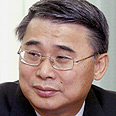
S.Korea takes first step in sanctions on north
In spite of North Korea's threats that any action by Seoul under UN resolution would 'drive inter-Korean relations to a catastrophe' and would be 'a grave provocative act' which could lead to war, South Korea announces that it would ban the entry of North Koreans who are part of Pyongyang's nuclear weapons program
The decision came after North Korea said any action by Seoul under the UN resolution would "drive the inter-Korean relations to a catastrophe" and would be "a grave provocative act" which could lead to war.
President Bush said Pyongyang's threats were aimed only at dividing the five nations that have been in talks with North Korea on ending its nuclear program.
"The leader of North Korea likes to threaten," Bush told a news conference on Wednesday. "What he's doing is just testing the will of the five countries that are working together to convince him there is a better way forward for his people."
He also reiterated that the United States would keep up diplomatic efforts to end the crisis.
But other US officials have not ruled out other options.
South Korea's Unification Minister Lee Jong-seok said Seoul would take action against the North beyond the UN Security Council resolution that mandated trade and financial sanctions.
"The government will ban the passage and stay (in the South) of persons and their family designated by (the UN Security Council) sanctions committee," Lee told a parliamentary committee.
The UN Security Council voted on October 14 to impose financial and arms sanctions on North Korea after it staged its first nuclear test earlier this month, but how those measures will be implemented remains a matter of debate.
China voted in favor of UN sanctions but both Beijing and Seoul fear that if they squeeze the impoverished North too tightly it could ruin ties and risk the North's collapse.
Russia has also urged caution in dealing with the crisis.
The United States, Russia, China, Japan and South Korea are all members of stalled six-party talks with North Korea.
Search ships
Travel between South and North Korea is already tightly regulated despite a sharp increase in the number of South Koreans who visit the North on business and on tours.
But the move could have a significant impact on Seoul's future ties with the North because it might affect key North Korean officials who take part in bilateral talks, said Yoo Ho-yeol, an expert on the North at Korea University.
Unification Minister Lee said Seoul would also invoke a maritime agreement with the North to search North Korean ships that make port calls in the South.
He did not comment on whether Seoul would suspend commercial projects in the North in an industrial zone where South Korean firms operate and a resort open to foreign tourists.
Seoul has been cautious about taking steps against the North, out of concern it could escalate tension on the Korean peninsula and hurt bilateral ties that it had worked hard to build over the past six years.
But Seoul has said it would not be business as usual after the October 9 nuclear test.
Many South Koreans, however, favor a more conciliatory policy. Former President Kim Dae-jung urged the United States to make "a bold decision" and accept Pyongyang's long-standing demand for direct talks.
"I hope President Bush makes the right decision now," Kim said in a column in the International Herald Tribune on Thursday.
But Washington said this was not possible until Pyongyang returned to the stalled six-party talks.
"With respect to direct dialogue, the North Koreans haven't expressed an interest in having dialogue with anybody really," Christopher Hill, the chief US envoy for North Korean Affairs, told reporters in Fiji on Thursday.
"We've made very clear that if they come back to the process we're certainly prepared to talk to them directly," he said.
In a joint declaration after talks between Chinese President Hu Jintao and visiting French President Jacques Chirac on Thursday, the two urged North Korea to return to six-party disarmament talks involving the two Koreas, Japan, Russia, the United States and host China.










